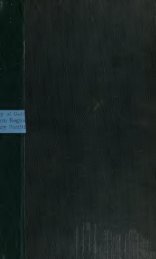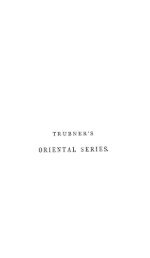Untitled
Untitled
Untitled
Create successful ePaper yourself
Turn your PDF publications into a flip-book with our unique Google optimized e-Paper software.
92' *' .FOURTH* DISCOURSE. ON PHYSICIANS<br />
^<br />
he imaghied himself to hjwe been transformed into a cow. All<br />
day he would cryout tb this one and that one saying, 'vCill me,<br />
so that a good stew may be prepared from my flesh '; until matters<br />
reached such a ,<br />
pass that, he would eat nothing, and the days<br />
passed and he continued o waste away, ^nd the physicians were<br />
unable to do him,any good.<br />
c<br />
" Now at this juncture Abu 'All (Avicenna) was prime<br />
minister, and the Shahinshah 'Ala'u'd-Dawla Muhammad ibn<br />
Dushmanziyar 1 favoured him greatly, and had entrusted into his<br />
hands all the affairs of the kingdom, and left all matters to ( his<br />
judgement and discretion. And indeed since Alexander the<br />
Great, whose minister was Aristotle,,, no King had had such a<br />
minister as Abu 'All. And during the time that he Was minister,<br />
he used to rise up every morning before dawn and write a couple<br />
of pages of the Shifd*. Then, when the true dawn appeared, he<br />
used to give audience to his disciples, such as Kiya Ra'i's<br />
Bahmanyar 3 Abu Mansur ibn ila , 4<br />
'Abdu'l-Wahid ,<br />
JuzjanP,<br />
Sulayman of Damascus, and me, Abu Kalanjar. We used tv'<br />
continue our studies till the morning grew bright, and then per-<br />
form our prayers behind him and as soon as we came forth we<br />
;<br />
were met at the gate of his house by a thousand mounted men,<br />
comprising the dignitaries and notables, as well as such as had<br />
boons to crave or were in difficulties. Then the minister would<br />
mount, and this company would attend him to the Government<br />
Offices. By the time he arrived there, the number of horsemen<br />
(AV) had reached two thousand. And there he would remain<br />
until the noon-tide prayer, and when he retired for refreshment<br />
a great company ate with him. Then he took his mid-day siesta,<br />
and when he rose up from this he would perform his prayeu,<br />
wait on the King, and remain talking and conversing with him<br />
until the afternoon prayer; and in all matters of state importance<br />
there was no third person between him and the King.<br />
" Our object in narrating these details is t c o shew that the<br />
minister had no leisure time. Now when tha> physicians proved<br />
unable to cure this young man, the case was represented to that<br />
puissant Prince 'Ala'u'd-Dawla, and his intercession was sought,<br />
so that he might bid his minister take the case in hand. So<br />
1 See Note XXX at end.<br />
2 One of Avicenna's most celebrated works. See ,the British Museum Arabic<br />
Catalogue, p. 745, and the Supplement to the same, No. 711, pp. 484-485.<br />
3 Abu'l-Hasan Bahmanyar ibn Marzuban al-Adharbayjani al-Majusi. He was<br />
one of Avicenna's most notable disciples, and died about A.H. 458 (A.D. loo^). v.Set<br />
f<br />
pp.<br />
V V T of the Persian notes.<br />
4 Abu Mansur al-Husayn ibn Muhammad ibn 'Umar ibn Zila al-Isfabani. He<br />
died.in A.H. 440 (A.D. 1048-49). See V V<br />
p. of the Persian notes.<br />
6 His kunya was Abu 'Ubayd and his father's name Muhammad. He attached<br />
himself to Avicenna in Jurja"








![La religione di Zarathustra nella storia religiosa dell' Iran [microform]..](https://img.yumpu.com/15970820/1/151x260/la-religione-di-zarathustra-nella-storia-religiosa-dell-iran-microform.jpg?quality=85)


